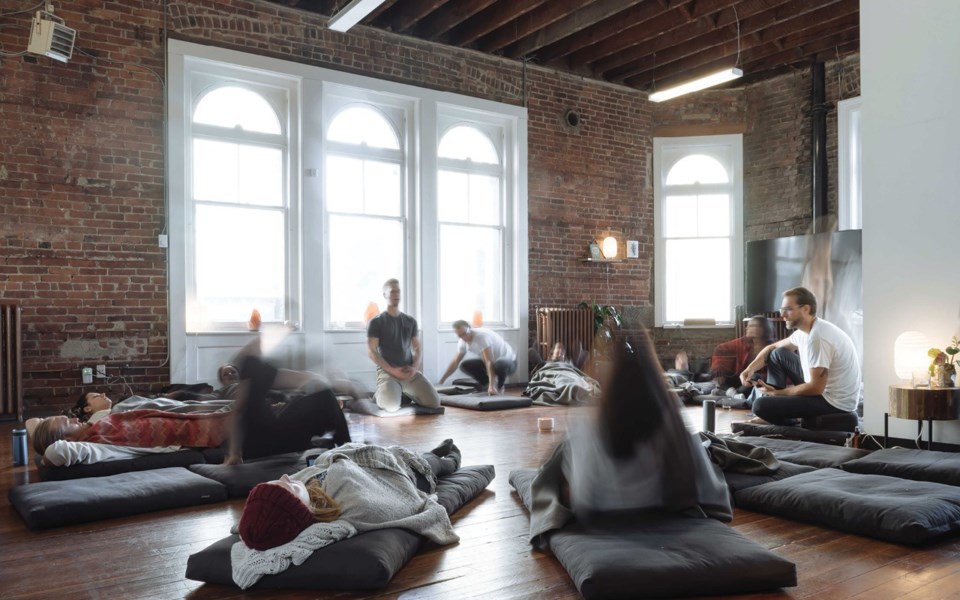Edward Dangerfield admits that he's a little bit intense, probably in the way that many Whistler folk are. Type A. Overachiever. Dive in. Go deep. He's working on that. He's been exploring his pathologies and life path since getting caught in an avalanche and completely burning out from the restaurant business in 2014. "I totally burned out and had what can only be described as an awakening slash total nervous breakdown," laughs the 38-year-old Englishman.
What followed was The Gentleman's Guide to Eat Pray Love, in which Dangerfield stumbled out of Whistler, and journeyed to Peru, Portugal and Poland, to variously contract altitude sickness and experience his first altered state, meditate in an off-grid stone cottage and churn up so much emotional history and trauma that he developed a daily drinking habit, and experienced an excruciatingly lonely fall in Poland. It was the year of rock bottom, and he genuinely considered ending it all—but instead, he flew back to Whistler, rented a bunk at the hostel, got a job bartending, and began to seek help. His plummet from the superstardom of founding and running a successful restaurant stunned friends, but, Dangerfield says, he finally felt free. And then he began seeking help in a wide range of alternative therapies, including somatic experiencing, freedom tapping, biofield energy healing and breathwork. "I knew I didn't want to go down the pharmaceutical route. I was tanked, but I knew that wasn't going to help."
After several years of immersing himself in this journey of understanding himself, trauma, the body, and the nervous system, he has come full circle, from seeker to teacher, arriving all the way back at the beginning, to rediscover the most basic and comprehensive technology we humans have. The breath. And in the breath, he has found his life's work and offering. Also, incidentally, a way to get high.
"I do get really passionate about things and fully immerse myself into them," admits Dangerfield. "And part of my journey is to try be a bit more balanced in my life. But I dived in because I knew I needed to. I was like: this is saving me. I wanted to save my life. And I needed to develop practices so I could regulate myself. So it's been a super intense five years."
Dangerfield is now trained in Chinese massage, Qi Gong, yoga, meditation, and breathwork—a quantum shift from the straight-laced life he prepared for as an uppercrust English private schoolboy with an economics degree. (Parents, take heed. That's what Whistler can do: Be the gateway to a parallel universe, if you walk all the way through.)
Now at the helm of Orbit Healing, Dangerfield has spent the last two years offering nervous-system regulation, through movement, breathwork and meditation, and facilitating retreats and men's circles. Specifically, he "guides people on breath journeys into altered states of consciousness to release unprocessed emotions from the cells of the physical body." The work can help treat addiction, depression, unresolved trauma, injury, low level sickness, or can be used simply to help process the garden variety of childhood dramas, that we'd like to imagine we can storm our way past into enlightened adulthood, but that in fact tend to remain lodged deeply and gunkily in our body's cells and crevices, sabotaging us when we least expect it.
Once Dangerfield starts talking about the breath, you will never look at the simple act of inhalation and exhalation the same way again. The breath is the bridge between the animal brain and the higher brain, the way to move a raw emotion into a completed story. The breath is the way of stimulating your endocrine system and your digestive system, of preventing stagnation in the body's various organs and systems. The breath is an ongoing dance between effort and ease, between loss and grace, between matter and spirit. Through it, we draw energy from the planet all around us. 26,000 times a day. Inhaling and exhaling. A kind of prayer.
Or not. Breathing happens sub-consciously. Inadvertently. We can spend our entire lives doing it, without realizing that we're sitting on the ultimate technology and medicine.
Dangerfield has come to learn, through intimate practice and the study of breath patterns, that a person can attain an altered brain state, or generate certain feelings, even get high, without any external substance. No drugs. Just the breath.
"There's a lot that's percolating here," says Dangerfield, of the growing interest in psychedelics, inspired in large part by Michael Pollan's latest book, How to Change Your Mind. "For me, it's really important that we realize that the external substance is not required to create the altered state. Mushrooms? Awesome, great. Peyote and ayuhuasca are wickedly powerful substances, and they will open up a lot of doors, and they'll open them all at the same time, quite often. Breathwork doesn't. It only opens up what's ready to be opened. Really gently and steadily."
Dangerfield's radical approach is, in many ways, the reclamation of ancient wisdom. "What I want to do is to honour the power and wisdom of the human body by listening really deeply to what it needs. I made a pursuit towards healing. That was my intention. I sat in my darkest time and said, I'm going to heal. And what that means is a return to the memory of wholeness." And through the power of breath, he's spreading it around.
The Velocity Project: how to slow the f*&k down and still achieve optimum productivity and life happiness.




